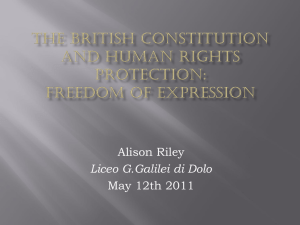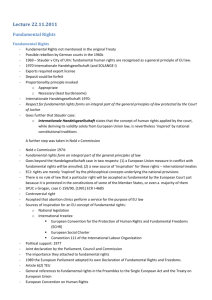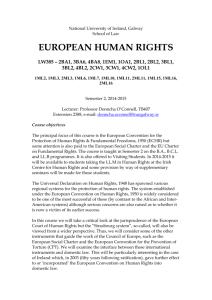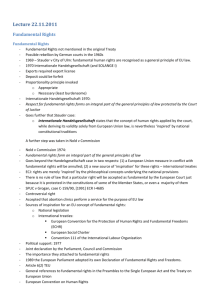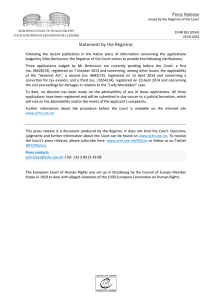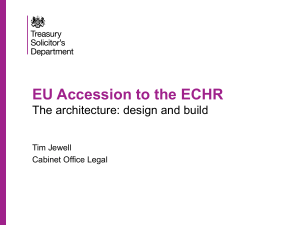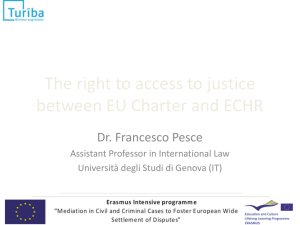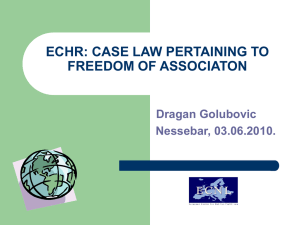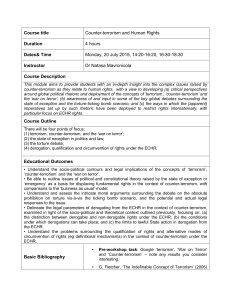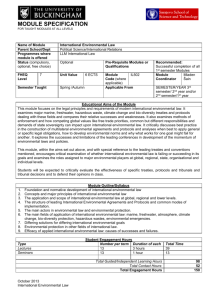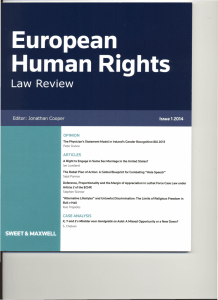European Human Rights Law
advertisement
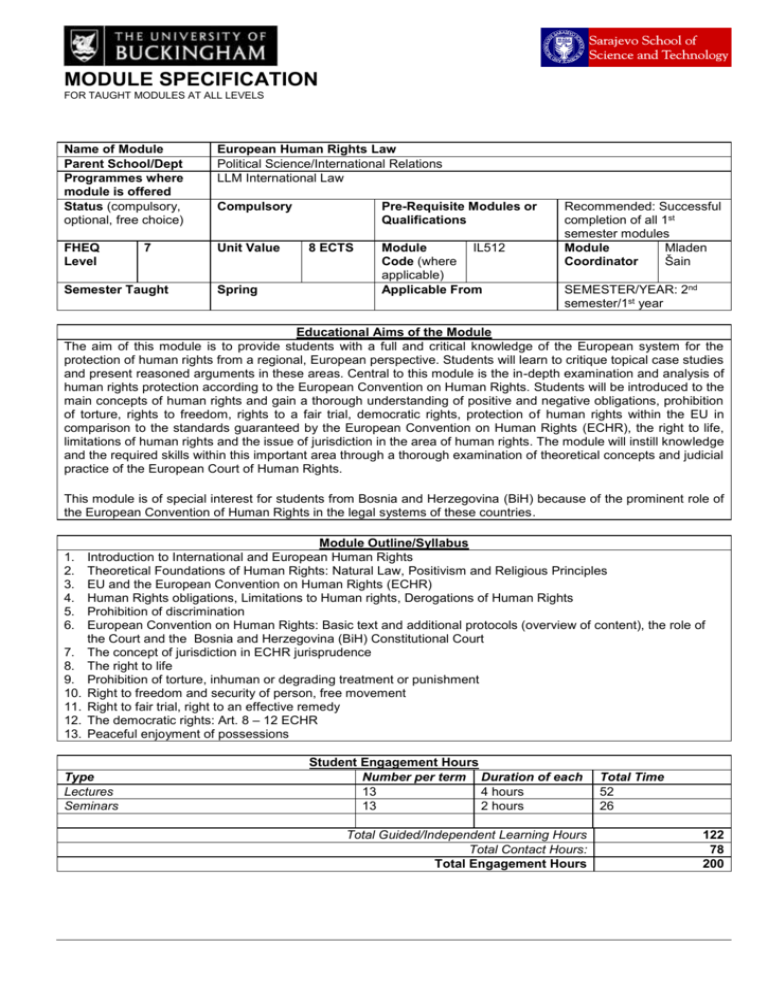
MODULE SPECIFICATION FOR TAUGHT MODULES AT ALL LEVELS Name of Module Parent School/Dept Programmes where module is offered Status (compulsory, optional, free choice) European Human Rights Law Political Science/International Relations LLM International Law FHEQ Level Unit Value 7 Semester Taught Compulsory Spring Pre-Requisite Modules or Qualifications 8 ECTS Module IL512 Code (where applicable) Applicable From Recommended: Successful completion of all 1st semester modules Module Mladen Coordinator Šain SEMESTER/YEAR: 2nd semester/1st year Educational Aims of the Module The aim of this module is to provide students with a full and critical knowledge of the European system for the protection of human rights from a regional, European perspective. Students will learn to critique topical case studies and present reasoned arguments in these areas. Central to this module is the in-depth examination and analysis of human rights protection according to the European Convention on Human Rights. Students will be introduced to the main concepts of human rights and gain a thorough understanding of positive and negative obligations, prohibition of torture, rights to freedom, rights to a fair trial, democratic rights, protection of human rights within the EU in comparison to the standards guaranteed by the European Convention on Human Rights (ECHR), the right to life, limitations of human rights and the issue of jurisdiction in the area of human rights. The module will instill knowledge and the required skills within this important area through a thorough examination of theoretical concepts and judicial practice of the European Court of Human Rights. This module is of special interest for students from Bosnia and Herzegovina (BiH) because of the prominent role of the European Convention of Human Rights in the legal systems of these countries. 1. 2. 3. 4. 5. 6. 7. 8. 9. 10. 11. 12. 13. Module Outline/Syllabus Introduction to International and European Human Rights Theoretical Foundations of Human Rights: Natural Law, Positivism and Religious Principles EU and the European Convention on Human Rights (ECHR) Human Rights obligations, Limitations to Human rights, Derogations of Human Rights Prohibition of discrimination European Convention on Human Rights: Basic text and additional protocols (overview of content), the role of the Court and the Bosnia and Herzegovina (BiH) Constitutional Court The concept of jurisdiction in ECHR jurisprudence The right to life Prohibition of torture, inhuman or degrading treatment or punishment Right to freedom and security of person, free movement Right to fair trial, right to an effective remedy The democratic rights: Art. 8 – 12 ECHR Peaceful enjoyment of possessions Type Lectures Seminars Student Engagement Hours Number per term Duration of each 13 4 hours 13 2 hours Total Guided/Independent Learning Hours Total Contact Hours: Total Engagement Hours Total Time 52 26 122 78 200 Type Written assignment (report on judicial implementation of the ECHR by the BiH Constitutional Court (contemporary issues, jurisprudence and challenges) regarding specific human rights) Mid-semester test (unseen written test conducted in class - case study, multiple choice) Written work (essay and/or moot court simulation) Examination (final exam) Assessment Method Summary Number required Duration Weighting 1 2000 words 20 % Timing/ Submission Deadline Week 6 1 1 hour 10% Mid-semester 1 2000 20% Week 11 1 3 hours 50% End of semester Module Outcomes Intended Learning Outcomes: Teaching/Learning Strategy: 1. Display mastery of the specialised knowledge relating to the notion and development of European Union human rights (history), philosophical underpinnings, legal character, practical protection (through a visit to the Constitutional Court), and the source of European human rights laws, prominently the ECHR; 2. Demonstrate a clear understanding of the evolution of European human rights laws, the guiding principles (including extraterritorial application of the ECHR) and the mechanisms for the protection of human rights within the Council of Europe; (The standards of protection in EU Law and the ECHR) and to communicate this understanding to specialist and nonspecialist audiences; 3. Demonstrate critical understanding of the obligations and standards concerning human rights protection under the ECHR; 4. Acquire and demonstrate critical awareness of current developments and problems arising in the area of European Human Rights Law. 1. Lectures provide the essential information (ILO: 1-4) 2. Seminars operate as a platform for group discussion, debate, presentations and topical case-study analysis in which students are encouraged to actively participate (ILO:1-4) 3. Students will be set assignments which test subject knowledge and enable independent research.(ILO:1-4) 4. Students are required to research, prepare and deliver a short presentation in class, and to participate in group debate on a given topic. Tutors will aid students and highlight strengths and weaknesses in their argument (ILO: 3,4) 5. Films (documentaries) will provide students with valuable knowledge, inciting discussion on issues arising in international human rights law (ILO: 1-4) 6. A site visit to the Constitutional Court of Bosnia and Herzegovina with subsequent legal report will offer students the opportunity to obtain thorough knowledge in the area of practical protection of human rights, according to the European Convention on Human Rights and foster critical awareness of the implementation of the European Convention on Human Rights (ILO: 1,3,4) Assessment Strategy: → → 1. Written examination: final exam (ILO:1-4) 2. Mid-semester test (ILO:1,2) 3. Set assignment: essay and/or moot court simulation (ILO: 1-4) 4. Report assessment (ILO: 3,4) Practical Skills: Teaching/Learning Strategy: 1. Employ advanced skills to conduct independent legal research and present the results in a coherent and clear format 2. Ability to interpret and apply the European Convention on Human Rights and the jurisprudence of the ECHR to a given set of facts and provide critical and in depth legal assessment of those facts from the aspect of European human rights law 3. Advanced ability and skills to use specialised on-line legal resources of jurisprudence (e.g. HUDOC) for research and tracking of recent developments in the area of European Human Rights Law 4. Ability to collect and thoroughly evaluate data and to write a concise and comprehensive report on judicial implementation of human rights 1. Lectures will provide the core information and seminars and group work will further develop practical skills in analysis and information retrieval. (PS. 1-3) 2. Short presentations in class will help students to present and practice legal arguments on specific (PS: 1,2,5) 3. Moot court simulation on short cases under supervision of the tutor will help students to obtain additional in-depth knowledge through preparation of moot court material. Tutors will have an instant and efficient opportunity to give students additional guidance on how to eliminate weak points in their knowledge and how to structure, apply and express the acquired knowledge appropriately (PS: 1-3) 4. Films (documentaries) will provide students with valuable in-depth understanding of practice, aiding in the interpretation and application of international criminal law (PS:1-4) 5. Guided preparation of report (PS: 1,4) → Assessment Strategy: → 1. Written examination: final exam, mid-semester test (PS: 1-3) 2. Group participation (group discussion, moot court simulation) (PS: 1-3) 3. Set assignments essay /report Transferable Skills: Teaching/Learning Strategy: 1. Ability to present reasoned arguments for decisions 2. Communication skills: written and oral 3. Information retrieval skills 4. Manage own learning successfully 5. Word-processing skills 1. Seminars provide a forum for discussion and develop skills in communication and information retrieval and presentation. (TS: 1-4) 2. Lectures provide a possibility of asking questions and obtaining answers and additional guidance in learning and independent research (TS: 1-4) 3. Short presentations on specific previously assigned topics in class (TS: 1-5) 4. Presentation of report (TS: 2-5) Assessment Strategy: → → 1. A final exam and mid-semester test will test student knowledge, cognitive ability and written skills. (TS: 1,2,3) 2. Set assignments (essay and/or moot court simulation) encourage guided independent learning and research, and allow students to practice academic writing skills, and communication skills as well as develop reasoned arguments. (TS: 1-5) 3. Report assessment (TS: 2-4) Key Texts and/or other learning materials Key texts: 1. White, R. C. A., Ovey, C., 2010. The European Convention on Human Rights. 5th ed. Oxford: Oxford University Press. 2. Janis, M. W., Kay, R. S., Bradley, A. W., 2008. European Human Rights Law: Text and Materials. 3rd ed. Oxford: Oxford University Press. Other learning materials: 3. Grabenwarther, Ch., 2013. The European Convention for the Protection of Human Rights and Fundamental Freedoms: A Commentary. Muenchen: C.H. Beck. 4. Harris, D., O'Boyle, M., Bates, E., Buckley, C., 2009. Law of the European Convention on Human Rights. 2nd ed. Oxford: Oxford University Press. 5. Gragl, P., 2013. The Accession of the European Union to the European Convention on Human Rights (Modern Studies in European Law). Portland: Hart Publishing. 6. European Court of Human Rights, 2013. Factsheets, (online). Available at http://www.echr.coe.int/ Pages/home.aspx?p=press/factsheets&c= (Accessed 16 July 2013). 7. European Court of Human Rights, 2013. Case-law analysis, (on-line). Available at http://www.echr.coe.int/Pages/home.aspx?p=caselaw/analysis&c=#n1347458601286_pointer (Accessed 16 July 2013). 8. European Court of Human Rights, 2013. Case law, (HUDOC on-line). Available at http://www.echr.coe.int/Pages/home.aspx?p=caselaw/HUDOC&c= (Accessed 16 July 2013). Please note: This specification provides a concise summary of the main features of the module and the learning outcomes that a typical student might reasonably be expected to achieve and demonstrate if he/she takes full advantage of the learning opportunities that are provided. More detailed information on the learning outcomes, content and teaching, learning and assessment methods of each module and programme can be found in the departmental or programme handbook. The accuracy of the information contained in this document is reviewed annually by the University of Buckingham and may be checked by the Quality Assurance Agency. Date of Production: Date approved by School Learning and Teaching Committee Date approved by School Board of Study Date approved by University Learning and Teaching Committee Date of Annual Review:
